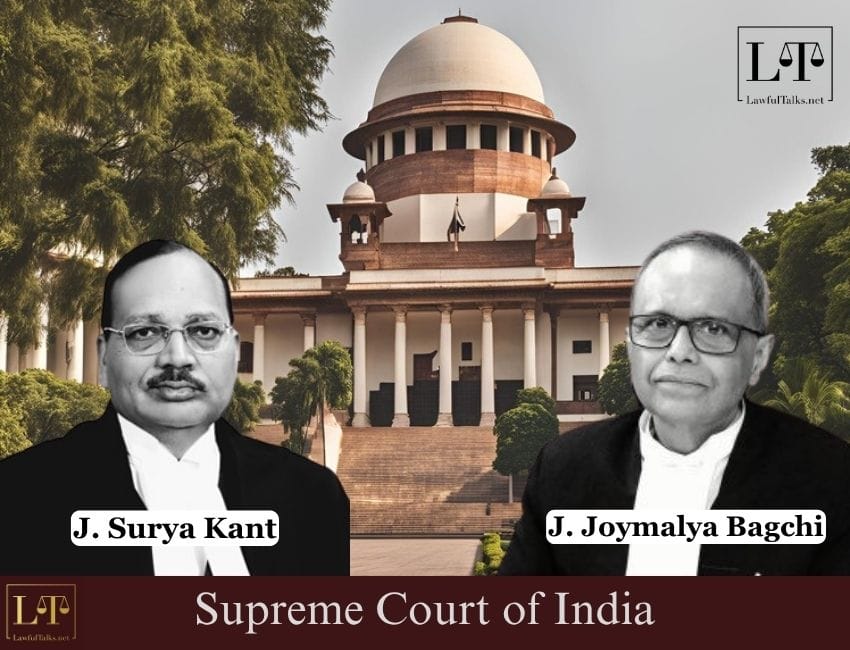Allahabad HC Sets Aside Afzal Ansari's Conviction, Allows Him to Continue as MP

The Supreme Court has ruled that objections concerning the absence of State consent under Section 6 of the Delhi Special Police Establishment Act, 1946 (DSPE) must be raised at the earliest possible stage, preferably soon after the registration of an FIR. The Bench of Justice Surya Kant and Justice Joymalya Bagchi clarified that once the investigation is complete, a chargesheet is filed, and a magistrate takes cognizance of the matter, such objections cannot be belatedly invoked to invalidate the proceedings, except where a quashing petition is already pending before cognizance is taken.

The case arose from allegations that M/s Narayan Niryat India Pvt. Ltd., (Respondent) a company incorporated under the Companies Act, had fraudulently availed large credit facilities from a consortium of banks. Initially granted a credit limit of ₹10.5 crores by UCO Bank, the company later secured additional facilities from Punjab National Bank and Corporation Bank, leading to a total sanctioned limit of ₹110.5 crores. When the company’s account was declared a Non-Performing Asset (NPA) on 31st March, 2013, recovery proceedings were initiated before the Debt Recovery Tribunal (DRT).
Subsequently, after failed attempts at a One Time Settlement (OTS), the banks filed complaints leading to the registration of an FIR on 5th November, 2020, under Sections 420 and 120-B of the Indian Penal Code, 1860 (IPC) and Sections 13(2) read with 13(1)(d) of the Prevention of Corruption Act, 1988. The Central Bureau of Investigation (CBI), upon completing its investigation, filed a chargesheet before the Special Magistrate, CBI, Indore, though corruption charges were dropped for want of sanction to prosecute bank officials.
The CBI challenged the Madhya Pradesh High Court’s Indore Bench decision of quashing the FIR and chargesheet, asserting that the High Court erred in declaring the investigation and ensuing proceedings invalid on the ground of lacking State consent under Section 6 of the DSPE Act. The CBI argued that such objections should have been raised immediately after the FIR was registered, not after the completion of the investigation and cognizance by the trial court. The agency further submitted that the High Court had exceeded its jurisdiction by assessing the merits of the allegations and effectively usurping the role of the trial court.
The Respondent contended that the CBI investigation was vitiated due to the absence of State consent under Section 6 of the DSPE Act. It argued that no offence was made out against its directors and that no wrongful loss had been caused to the banks. On these grounds, it sought quashing of the FIR, the charge sheet, and the entire proceedings pending before the trial court.
The Supreme court agreed with the CBI’s stance and found that the High Court’s reasoning was “misconceived and misdirected.” The Supreme Court emphasized the principle that objections regarding the CBI’s jurisdiction must be raised promptly, and cannot be used later as a tool to nullify valid proceedings once cognizance has been taken.
“In our considered opinion, both the reasons given by the High Court are misconceived and misdirected. We say so for the reasons that lack of consent under Section 6 of the Delhi Special Police Establishment Act, 1946 ought to have been raised soon after registration of FIR. Once the investigation is complete, chargesheet has been filed and the court of competent jurisdiction
has taken cognizance, no such plea can be raised to vitiate the validity of an order taking cognizance of the chargesheet, save and except when it causes severe miscarriage of justice; or where proceedings for quashing of the FIR have been initiated and a chargesheet has been filed during pendency of the quashing proceedings. In such a case, the aggrieved person may have some justification in contending that the filing of a chargesheet during the pendency of the quashing proceedings will not prejudice his right.” the Court observed.
The Bench termed the High Court’s approach “irrational,” noting that the present case did not involve any pending quashing petition when the chargesheet was filed. Therefore, the respondents could not belatedly invoke the plea of lack of State consent. The Supreme Court further held that the High Court had exceeded its jurisdiction by delving into disputed factual issues that should be determined through evidence before the trial court.
“Adverting to the findings on merits returned by the High Court on the merits of the allegations, it seems to us that the High Court exceeded its jurisdiction while assuming the role of a Trial Court. There are debatable issues which ought to have been left to the wisdom of the Trial Court.” the Court said.
Setting aside the Madhya Pradesh High Court’s order dated 8th August, 2024, the Supreme Court restored the criminal proceedings against the Respondents. It directed the XXVII Additional Sessions Judge, Indore, to proceed with the matter in accordance with law. The Court also clarified that if, during the trial, a prima facie case emerges against any bank officials under the Prevention of Corruption Act or any other penal provision, the trial court may summon them to face trial.
The respondents were directed to appear before the trial court on 28th October, 2025, and furnish bail bonds to its satisfaction. Consequently, the earlier attachment orders passed by the Supreme Court against the personal and family assets of the company’s Managing Director and Director were vacated.
Case Details: Central Bureau Of Investigation vs. M/S Narayan Niryat India PVT. LTD & Ors., Criminal Appeal No. 4390 of 2025
Advocate for the Petitioner: Additional Solicitor General Suryaprakash V Raju.
Advocate for the Respondent: Senior Advocate Mr. Sidharth Luthra.

Anushka Bandekar
Advocate
Latest Posts
Categories
- International News 19 Posts
- Supreme Court 390 Posts
- High Courts 383 Posts



















































































































































































































































































































































































































































































































































































































































































































































































































